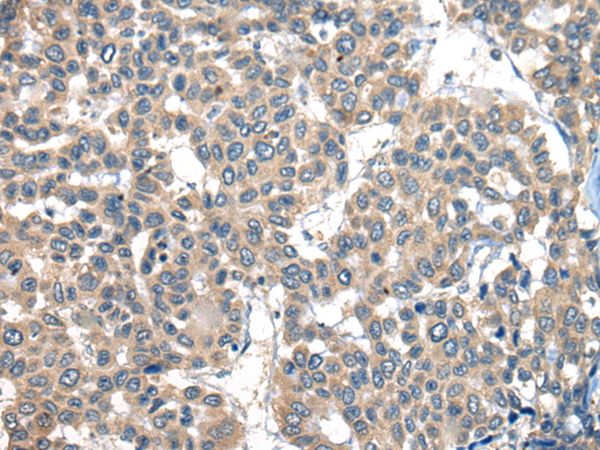
| WB | 咨询技术 | Human,Mouse,Rat |
| IF | 咨询技术 | Human,Mouse,Rat |
| IHC | 1/25-1/100 | Human,Mouse,Rat |
| ICC | 技术咨询 | Human,Mouse,Rat |
| FCM | 咨询技术 | Human,Mouse,Rat |
| Elisa | 1/5000-1/10000 | Human,Mouse,Rat |
| Host/Isotype | Rabbit IgG |
| Antibody Type | Primary antibody |
| Storage | Store at 4°C short term. Aliquot and store at -20°C long term. Avoid freeze/thaw cycles. |
| Species Reactivity | Human, Mouse, Rat |
| Immunogen | Synthetic peptide of human PDK1 |
| Formulation | Purified antibody in PBS with 0.05% sodium azide and 50% glycerol. |
+ +
以下是3篇关于PDK1抗体的参考文献摘要,供参考:
---
1. **"Characterization of a 3-phosphoinositide-dependent protein kinase which phosphorylates and activates protein kinase Bα"**
*Alessi, D.R. et al. (1997)*
该研究首次报道了PDK1的克隆与功能特性,开发了特异性抗体用于检测PDK1在细胞中的表达及与PKB(Akt)的相互作用,证实PDK1通过磷酸化Akt的Thr308位点调控其活性。
2. **"Role of PDK1 in cell cycle progression and tumorigenesis"**
*Mora, A. et al. (2004)*
作者利用PDK1特异性抗体进行免疫印迹和免疫组化,发现PDK1在多种癌细胞中高表达,并通过调控下游激酶影响细胞周期进程,提示其作为癌症治疗靶点的潜力。
3. **"Mouse PDK1 regulates cell proliferation and survival through Akt/PKB and SGK1 pathways"**
*Bayascas, J.R. et al. (2008)*
通过构建PDK1条件性敲除小鼠模型,结合抗体检测组织中的PDK1蛋白表达,揭示了PDK1通过调控Akt和SGK1信号通路维持细胞存活和增殖的分子机制。
---
以上文献均发表于《EMBO Journal》《Cell》等高水平期刊,可提供PDK1抗体在蛋白质检测、信号通路研究及疾病模型中的应用参考。
The 3-phosphoinositide-dependent protein kinase 1 (PDK1) is a serine/threonine kinase that plays a central role in regulating cell survival, growth, and metabolism through the PI3K/Akt signaling pathway. As a master upstream activator, PDK1 phosphorylates and activates multiple AGC kinase family members, including Akt/PKB, SGK, and PKC isoforms. Its function is particularly crucial in insulin signaling, cancer progression, and cellular responses to oxidative stress. PDK1 antibodies are essential tools for studying its expression, localization, and activity in various biological contexts. These antibodies are typically developed in host species like rabbits or mice using immunogenic peptides derived from conserved regions of the PDK1 protein. High-quality PDK1 antibodies exhibit specificity confirmed by knockout (KO) validation and demonstrate reactivity across human, mouse, and rat samples. Researchers employ PDK1 antibodies in techniques such as Western blotting, immunohistochemistry (IHC), immunofluorescence (IF), and immunoprecipitation (IP) to investigate PDK1’s role in diseases like diabetes, cancer, and neurodegenerative disorders. Recent studies also explore PDK1 inhibition as a therapeutic strategy, making its antibodies valuable for drug development research. Proper validation remains critical due to potential cross-reactivity with homologous kinases in the AGC family.
×